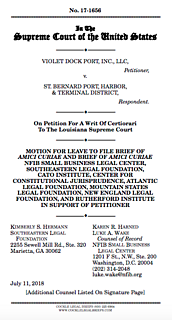That deference has resulted in unbelievable situations like the one in which Violet Dock Port, just south of New Orleans, finds itself. As a thriving private port on the Mississippi River, Violet Dock Port came into competition with the St. Bernard Parish Port, Harbor, & Terminal District (“Port Authority”) six miles away. Preferring to avoid competition with a private firm, the Port Authority colluded with Associated Terminals, another private company, to improve its position in the market. The Port Authority used its eminent domain power to condemn Violet Dock Port then leased it to Associated Terminals to continue the cargo operations. The idea was that the Port Authority could foreclose competition in the market and use the money made off the lease to Associated Terminals to improve its position and expand its operations in the future. When Violet Dock sued, claiming that the taking was pretextual, the trial court refused to acknowledge evidence that the scheme was concocted simply to boost the Port Authority’s position in the commercial market. On appeal, the Louisiana State Supreme Court affirmed the lower court’s decision.
Cato has joined the NFIB Small Business Legal Center, the Southeastern Legal Foundation, the Center for Constitutional Jurisprudence, the Atlantic Legal Foundation, the Mountain States Legal Fund, the New England Legal Foundation, and the Rutherford Institute in a brief supporting Violet Dock Port’s request that the Supreme Court accept its case and review the flawed decision of the Louisiana Supreme Court. The brief urges the Supreme Court to affirm that pretextual takings are not permitted—that takings for “public use” must actually be for the good of the public, rather than just transferring property rights among private parties. If this particular taking is not initially foreclosed as pretextual, then, at the very least, the Court should accept the case to explain that, when the condemning entity is acting as a market participant rather than as a sovereign, eliminating competition does not satisfy the Fifth Amendment’s public-use requirement. Without such a limiting principle, predatory behavior meant only to advance a public entity’s commercial ventures will flourish. Ideally, the Supreme Court would also take this opportunity to revisit its decision in Kelo v. City of New London, recognizing that it made a mistake in allowing the definition of “public use” to encompass transfers between private parties and breathing life back into the text of the Fifth Amendment.

